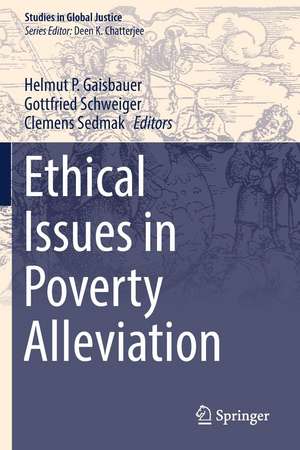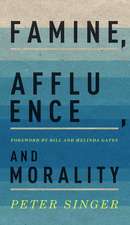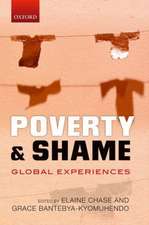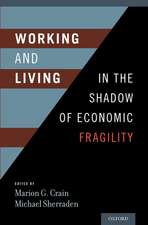Ethical Issues in Poverty Alleviation: Studies in Global Justice, cartea 14
Editat de Helmut P. Gaisbauer, Gottfried Schweiger, Clemens Sedmaken Limba Engleză Paperback – 6 sep 2017
An impressive collection of essays by an international group of scholars on one of the most fundamental issues of our age. The authors consider crucial aspects of poverty alleviation: the role of human rights; the connection between development aid and the alleviation of poverty; how to think about poverty within affluent countries (particularly in Europe); and individual versus collective obligations to act to reduce poverty. Judith Lichtenberg
Department of Philosophy
Georgetown University
This collection of essays is most welcome addition to the burgeoning treatments of poverty and inequality. What is most novel about this volume is its sustained and informed attention to the explicitly ethical aspects of poverty and poverty alleviation. What are the ethical merits and demerits of income poverty, multidimensional-capability poverty, and poverty as nonrecognition? How important is poverty alleviation in comparison to environmental protection and cultural preservation? Who or what should be agents responsible for reducing poverty? The editors concede that their volume is not the last word on these matters. But, these essays, eschewing value neutrality and a retreat into technical mastery, challenge us to find fresh and reasonable answers to these urgent questions.
David A. Crocker
School of Public Policy
University of Maryland
| Toate formatele și edițiile | Preț | Express |
|---|---|---|
| Paperback (1) | 354.54 lei 6-8 săpt. | |
| Springer International Publishing – 6 sep 2017 | 354.54 lei 6-8 săpt. | |
| Hardback (1) | 589.84 lei 6-8 săpt. | |
| Springer International Publishing – 4 oct 2016 | 589.84 lei 6-8 săpt. |
Din seria Studies in Global Justice
-
 Preț: 212.66 lei
Preț: 212.66 lei - 18%
 Preț: 1222.49 lei
Preț: 1222.49 lei - 18%
 Preț: 942.44 lei
Preț: 942.44 lei - 15%
 Preț: 639.73 lei
Preț: 639.73 lei - 15%
 Preț: 636.80 lei
Preț: 636.80 lei - 18%
 Preț: 892.74 lei
Preț: 892.74 lei - 15%
 Preț: 648.24 lei
Preț: 648.24 lei -
 Preț: 446.47 lei
Preț: 446.47 lei - 15%
 Preț: 641.71 lei
Preț: 641.71 lei - 18%
 Preț: 731.91 lei
Preț: 731.91 lei - 15%
 Preț: 587.72 lei
Preț: 587.72 lei - 18%
 Preț: 945.47 lei
Preț: 945.47 lei - 24%
 Preț: 626.04 lei
Preț: 626.04 lei - 18%
 Preț: 892.28 lei
Preț: 892.28 lei - 18%
 Preț: 948.92 lei
Preț: 948.92 lei - 15%
 Preț: 641.03 lei
Preț: 641.03 lei - 15%
 Preț: 637.13 lei
Preț: 637.13 lei - 15%
 Preț: 638.57 lei
Preț: 638.57 lei - 15%
 Preț: 635.96 lei
Preț: 635.96 lei - 18%
 Preț: 947.50 lei
Preț: 947.50 lei - 15%
 Preț: 639.25 lei
Preț: 639.25 lei
Preț: 354.54 lei
Nou
Puncte Express: 532
Preț estimativ în valută:
67.86€ • 73.74$ • 57.04£
67.86€ • 73.74$ • 57.04£
Carte tipărită la comandă
Livrare economică 21 aprilie-05 mai
Preluare comenzi: 021 569.72.76
Specificații
ISBN-13: 9783319636474
ISBN-10: 3319636472
Pagini: 280
Ilustrații: VIII, 280 p. 1 illus.
Dimensiuni: 155 x 235 mm
Greutate: 0.41 kg
Ediția:1st ed. 2016
Editura: Springer International Publishing
Colecția Springer
Seria Studies in Global Justice
Locul publicării:Cham, Switzerland
ISBN-10: 3319636472
Pagini: 280
Ilustrații: VIII, 280 p. 1 illus.
Dimensiuni: 155 x 235 mm
Greutate: 0.41 kg
Ediția:1st ed. 2016
Editura: Springer International Publishing
Colecția Springer
Seria Studies in Global Justice
Locul publicării:Cham, Switzerland
Cuprins
1 Ethical Issues in Poverty Alleviation: Agents, Institutions and Policies; Helmut P. Gaisbauer/Gottfried Schweiger/Clemens Sedmak.- I Human Rights and Poverty Alleviation.- 2 Are we violating the human rights of the world’s poor?; Thomas Pogge.- 3 A Decent Social Minimum as a Matter of Justice; Elena Pribytkova.- 4 Children’s rights, bodily integrity and poverty alleviation; Gunter Graf and Mar Cabezas.- II Poverty Alleviation and Development.- 5 A Human Right to Financial Inclusion; Jahel Queralt Lange.- 6 Is globalizing ‘development’ ethical? A view from the Pacific; Joy Paton/Elisabeth Valiente-Riedl.- 7 Animals in International Development, Ethics, Dilemmas and Possibilities; Max Kelly.- 8 The Sustainable Development Goals: pitfalls and challenges where we now need to start making progress; Gottfried Schweiger.- III Poverty and Poverty Alleviation in the Welfare State.- 9 Relative Poverty as a Threat to Human Dignity: On the Structure Injustice of Welfare States; Christian Neuhäuser.- 10 Suffering Within, Suffering Without: Paradoxes of Poverties in Welfare States.- Helmut P. Gaisbauer/Elisabeth Kapferer.- 11 Exclusion from healthcare in Spain: The responsibility for omission of due care; Rosana Triviño,David Rodríguez-Arias and Txetxu Ausín.- IV Obligations to Poverty Alleviation.- 12 Poverty, Injustice and Obligations to take Political Action; Elizabeth Kahn.- 13 Beyond the Redistributive Paradigm: What Philosophers Can Learn From Poor-Led Politics; Monique Deveaux.- 14 Migration in a World of Citizens, Nonsensical Morality and Academia’s Role in Addressing Hidden Poverty; Tendayi Bloom.- 15 Poverty Alleviation: an Opportunity for Universities; Clemens Sedmak.
Notă biografică
Helmut P. Gaisbauer is Senior Scientist at the Centre for Ethics and Poverty Research, University of Salzburg. Recent publications include: (with Gottfried Schweiger & Clemens Sedmak) Philosophical Explorations of Justice and Taxation. Dordrecht: Springer 2015; (with Clemens Sedmak) Neglected Futures. Considering Overlooked Poverty in Europe; in: Special Issue of European Journal of Futures Research: The Future of Europe 2014, 2–8.
Gottfried Schweiger is Senior Scientist at the Centre for Ethics and Poverty Research, University of Salzburg and there the Principal Investigator of a research project “Social Justice and Child Poverty”, funded by the Austrian Science Fund (FWF). Recent publications include: (with Gunter Graf) The Subjective Experience of Poverty, in: Northern European Journal of Philosophy 15 (2) 2015, 148–67; (with Gunter Graf). A Philosophical Exploration of Social Justice and Child Poverty. Basingstoke: Palgrave Macmillan 2015.
Clemens Sedmak is FD Maurice Professor of Moral and Social Theology, King’s College London and Associate Director of the Centre for Ethics and Poverty Research, University of Salzburg. Recent publications include: (ed. with Elisabeth Kapferer & Andreas Koch) Strengthening Intangible Infrastructures. Newcastle upon Tyne: Cambridge Scholars Publishing 2014; Sustainability: Ethical Perspectives, in: C. Weidinger et al. (eds.): Sustainable Entrepreneurship, CSR, Sustainability, Ethics & Governance. Berlin-Heidelberg: Springer 2014, 51–65.
Gottfried Schweiger is Senior Scientist at the Centre for Ethics and Poverty Research, University of Salzburg and there the Principal Investigator of a research project “Social Justice and Child Poverty”, funded by the Austrian Science Fund (FWF). Recent publications include: (with Gunter Graf) The Subjective Experience of Poverty, in: Northern European Journal of Philosophy 15 (2) 2015, 148–67; (with Gunter Graf). A Philosophical Exploration of Social Justice and Child Poverty. Basingstoke: Palgrave Macmillan 2015.
Clemens Sedmak is FD Maurice Professor of Moral and Social Theology, King’s College London and Associate Director of the Centre for Ethics and Poverty Research, University of Salzburg. Recent publications include: (ed. with Elisabeth Kapferer & Andreas Koch) Strengthening Intangible Infrastructures. Newcastle upon Tyne: Cambridge Scholars Publishing 2014; Sustainability: Ethical Perspectives, in: C. Weidinger et al. (eds.): Sustainable Entrepreneurship, CSR, Sustainability, Ethics & Governance. Berlin-Heidelberg: Springer 2014, 51–65.
Textul de pe ultima copertă
This book explores the philosophical, and in particular ethical, issues concerning the conceptualization, design and implementation of poverty alleviation measures from the local to the global level. It connects these topics with the ongoing debates on social and global justice, and asks what an ethical or normative philosophical perspective can add to the economic, political, and other social science approaches that dominate the main debates on poverty alleviation. Divided into four sections, the volume examines four areas of concern: the relation between human rights and poverty alleviation, the connection between development and poverty alleviation, poverty within affluent countries, and obligations of individuals in regard to global poverty.
An impressive collection of essays by an international group of scholars on one of the most fundamental issues of our age. The authors consider crucial aspects of poverty alleviation: the role of human rights; the connection between development aid and the alleviation of poverty; how to think about poverty within affluent countries (particularly in Europe); and individual versus collective obligations to act to reduce poverty. Judith Lichtenberg
Department of Philosophy
Georgetown University
This collection of essays is most welcome addition to the burgeoning treatments of poverty and inequality. What is most novel about this volume is its sustained and informed attention to the explicitly ethical aspects of poverty and poverty alleviation. What are the ethical merits and demerits of income poverty, multidimensional-capability poverty, and poverty as nonrecognition? How important is poverty alleviation in comparison to environmental protection and cultural preservation? Who or what should be agents responsible for reducing poverty? The editors concede that their volume is not the last word on these matters. But, these essays, eschewing value neutrality and a retreat into technical mastery, challenge us to find fresh and reasonable answers to these urgent questions.
David A. Crocker
School of Public Policy
University of Maryland
An impressive collection of essays by an international group of scholars on one of the most fundamental issues of our age. The authors consider crucial aspects of poverty alleviation: the role of human rights; the connection between development aid and the alleviation of poverty; how to think about poverty within affluent countries (particularly in Europe); and individual versus collective obligations to act to reduce poverty. Judith Lichtenberg
Department of Philosophy
Georgetown University
This collection of essays is most welcome addition to the burgeoning treatments of poverty and inequality. What is most novel about this volume is its sustained and informed attention to the explicitly ethical aspects of poverty and poverty alleviation. What are the ethical merits and demerits of income poverty, multidimensional-capability poverty, and poverty as nonrecognition? How important is poverty alleviation in comparison to environmental protection and cultural preservation? Who or what should be agents responsible for reducing poverty? The editors concede that their volume is not the last word on these matters. But, these essays, eschewing value neutrality and a retreat into technical mastery, challenge us to find fresh and reasonable answers to these urgent questions.
David A. Crocker
School of Public Policy
University of Maryland
Caracteristici
Covers a broad range of ethical issues involved in poverty alleviation Sheds light on special topics, including child poverty, animals, and the role of academic Brings together different approaches and normative frameworks Is the first to combine papers from top scholars on ethical issues in poverty alleviation Includes supplementary material: sn.pub/extras












